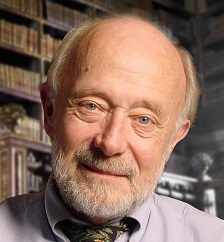By Bob Allen
The liberal, intellectual approach to Christianity pioneered by recently deceased Jesus scholar Marcus Borg isn’t the Christianity taught in the Bible, a Southern Baptist theologian and seminary president said Jan. 28.
 Borg, 72, a driving force in a movement known as “progressive Christianity” challenging fundamentalist interpretations of the Bible advanced by the Religious Right, died Jan. 21 at his home in Powell Butte, Ore., after an illness.
Borg, 72, a driving force in a movement known as “progressive Christianity” challenging fundamentalist interpretations of the Bible advanced by the Religious Right, died Jan. 21 at his home in Powell Butte, Ore., after an illness.
He was among a group active in the 1980s and 1990s known as the Jesus Seminar, in which scholars voted with colored beads to decide their collective view about the historicity of sayings and deeds attributed to Jesus in the New Testament.
Though controversial, their thinking paved the way for a new wave of progressive Christian authors like Brian McLaren, Rob Bell and Diana Butler Bass questioning church dogma they believe hinders many people from taking Jesus seriously in a postmodern world.
“It may well be that Marcus Borg was in no sense an atheist, but he was also in no sense an orthodox Christian,” Albert Mohler, president of Southern Baptist Theological Seminary in Louisville, Ky., commented on Borg’s passing in a podcast briefing at AlbertMohler.com. That is in part, Mohler said, because he doubted that Jesus literally rose from the dead.
“Anyone who rejects the bodily resurrection of Jesus Christ is not meeting the very clear statement of the apostle Paul in Romans, chapter 10, when he says that salvation comes to the one who confesses with the lips that Jesus Christ is Lord and believes in the heart that God has raised him from the dead,” Mohler said, “a point that Paul, we believe, by the inspiration of the Holy Spirit made emphatically in First Corinthians, chapter 15, as well.”
“But here you have evidence of the redefinition of Christianity into what is called Progressive Christianity,” Mohler said, repeating his recent claim that “when you’re looking at liberal Christianity and biblical Christianity, you’re not looking at two variants of one religion, but two very different religions.”
“The same is true of biblical Christianity and what is now called Progressive Christianity,” Mohler said.
Borg, an Episcopalian who taught religion and culture for 28 years at Oregon State University, wrote or co-wrote 21 books, including the 1994 Meeting Jesus Again for the First Time, the single best-selling book by a contemporary Jesus scholar.
His Jesus: Uncovering the Life, Teachings and Relevance of a Religious Revolutionary is a New York Times bestseller. The Heart of Christianity, published in 2003, has been a group study book in hundreds of churches.
In his last book, the memoir Convictions: How I Learned What Matters Most written on the occasion of his 70th birthday, Borg reflected on awareness of his own death. “Imagine that Christianity is about loving God,” he wrote. “Imagine that it’s not about the self and its concerns, about ‘what’s in it for me,’ whether that be a blessed afterlife or prosperity in this life.”
In a November 2013 Patheos blog titled “What is a Christian?,” Borg said Christianity is not about “right beliefs” but rather “a changed heart.”
In a follow-up post titled “What is the Gospel?,” he noted that Jesus’ first followers described the “good news” not in terms of the afterlife but instead “the coming kingdom of God.”
“Importantly, ‘the kingdom of God’ was not about life in the next world, not about heaven, but life on earth,” Borg wrote. “The coming of the kingdom of God on earth was about justice and peace. Justice: that everybody should have enough (‘daily bread’) of the material basis of life. Peace: the end of war and violence.”
“Jesus’ passion — what he was passionate about — was God and the kingdom of God,” Borg continued. “It involves a twofold transformation: of ourselves and of ‘this world.’”
In a January 2014 blog on “What the Bible is,” Borg said arguing over biblical authority with literalists always ends in an impasse over the question, “If all of the Bible isn’t inerrant, how do we decide what parts are inerrant and what parts are not?”
Borg said choosing between the “all the Bible is inerrant” or “some of it is, and some isn’t,” isn’t the only option. He said he viewed the whole Bible as “a human product” passing on the shared experience of spiritual forbears in the sense that Paul described his own proclamation of the gospel as a “treasure in earthen vessels.”
“So it’s not that the Bible is inerrant, or parts of it are and parts of it aren’t,” he explained. “It is all a human product. And yet it is ‘treasure’ in an earthen vessel. It is the witness and testimony of our spiritual ancestors.”
Previous story:
SBC leader sees ‘chasm’ between liberal, evangelical denominations
